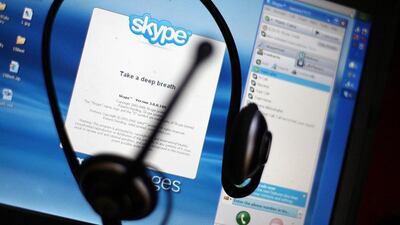In August 1964, Isaac Asimov wrote in The New York Times about an IBM computer debuted at the New York World's Fair that could translate written English into Russian. "If machines are that smart today, what may not be in the works 50 years hence?" he asked.
Yesterday, almost exactly 50 years after Asimov’s article, Microsoft demonstrated real-time, spoken-word translation software for Skype, in a move that has sent tech bloggers hunting for science fiction precedents for the technology.
Microsoft's chief executive, Satya Nadella, announced that the tool would be launched on Windows 8 phones before the end of the year. He was speaking at the Code Conference, an industry meeting organised by the tech website Re/code.
But the technology is not yet 100 per cent accurate, Mr Nadella pointed out.
Skype, a Swedish-Estonian start-up launched in 2003, was acquired by Microsoft for US$8.5 billion in 2011. It boasts 300 million users monthly, according to Microsoft.
Mr Nadella suggested that the program was capable of learning autonomously. “If you teach it English, it learns English,” he said. “Then you teach it Mandarin, it learns Mandarin, but it becomes better at English. Then you teach it Spanish – it’ll get good at Spanish, but it’ll get great at both Mandarin and English, and quite frankly none of us know exactly why.”
Microsoft is comparing the product to Star Trek's "Universal Translator", which allowed human protagonists to understand their Klingon and Jem'Hadar antagonists.
But Star Trek's is not the only fictional universe in which instant translation technology aids communication with aliens.
The British science fiction author Douglas Adams, the writer of The Hitchhiker's Guide to the Galaxy, once imagined the ultimate translation tool: "The Babel fish is small, yellow and leech-like … and if you stick [it] in your ear you can instantly understand anything said to you in any form of language."
While the translators of both Star Trek and The Hitch-Hiker's Guide to the Galaxy functioned by scanning brain waves and turning this data into the desired language, Skype's algorithms use a "neural network" that combines speech recognition, machine translation and speech synthesis, Mr Nadella said.
A word of warning for Microsoft, however, from Douglas Adams: “The poor Babel fish, by effectively removing all barriers to communication between different races and cultures, has caused more and bloodier wars than anything else in the history of creation.”
abouyamourn@thenational.ae
Follow us on Twitter @Ind_Insights

